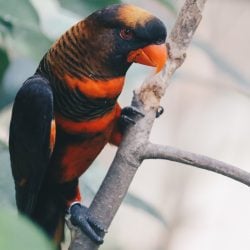Last Updated on by Catherine Tobsing
Parrots can make wonderful pets for the right person or family, but they also come with unique challenges that make them less suitable for everyone.
Here are some reasons why parrots may not make good pets for some people:
- Long Lifespan: Some parrots can live for several decades, with select species living 50 to 80 years or more. This means that keeping a pet bird is a long-term commitment, and potential owners need to be prepared for a lifetime of care and responsibility.
- Social Needs: Parrots are highly social animals that require a lot of interaction and mental stimulation. They can become depressed, anxious, or even develop behavioral issues if they are not provided with enough social interaction and mental stimulation.
- Noise: Many parrot species are known for their loud calls and vocalizations. This can be disruptive in a household, especially in apartments or close living quarters, and may not be suitable for people who require a quiet environment.
- Destructive Behavior: Parrots have strong beaks and love to chew on things. They can destroy furniture, walls, and other household items if not properly supervised or provided with appropriate toys and enrichment.
- Mess: Parrots are messy creatures. They produce feathers, dander, and food debris, which can require regular cleaning and maintenance to keep their environment clean and hygienic. If you don’t like to vacuum, don’t get a bird.
- Specialized Diet: Parrots have specific dietary requirements that may involve a variety of fresh fruits, vegetables, nuts, seeds, and pellets. Providing a balanced diet can be both time-consuming and expensive.
- Veterinary Care: Finding an avian veterinarian who is knowledgeable about parrot care can be challenging in some areas. Regular check-ups and potential health issues should be considered when owning a parrot.
- Training and Socialization: Parrots need consistent training and socialization to prevent behavioral problems. They can become territorial, aggressive, or overly attached to one person if not properly trained.
- Legal Restrictions: In some places, there may be legal restrictions on owning certain parrot species due to conservation concerns. Prospective parrot owners should research local laws and regulations.
- Allergies: Some people may be allergic to parrot feathers, dander, or their food, which can cause health issues and discomfort.
So while parrots can make rewarding and affectionate companions for individuals who are willing to meet their unique needs, potential owners should carefully consider these factors before bringing a parrot into their home.
It’s essential to research and understand the specific requirements of the parrot species you are interested in and be prepared for a lifelong commitment to their care and well-being.
Written and Approved by the Windy City Parrot Content Team
Author Profile
Latest entries
 The Traveling BirdJune 26, 2025Can You Name 5 Parrot Species That Are Living Wild in the USA?
The Traveling BirdJune 26, 2025Can You Name 5 Parrot Species That Are Living Wild in the USA? Bird BehaviorJune 26, 2025How is it Parrots Are Problem Solvers Social Animals and Even Use Tools?
Bird BehaviorJune 26, 2025How is it Parrots Are Problem Solvers Social Animals and Even Use Tools? Bird & Parrot AnatomyJune 25, 2025How a Tiny Chemical Modification Makes Parrots Nature’s Living Paintings
Bird & Parrot AnatomyJune 25, 2025How a Tiny Chemical Modification Makes Parrots Nature’s Living Paintings PigeonsJune 20, 2025How Do Parrots Thrive in Cities Outside Their Native Habitats?
PigeonsJune 20, 2025How Do Parrots Thrive in Cities Outside Their Native Habitats?




